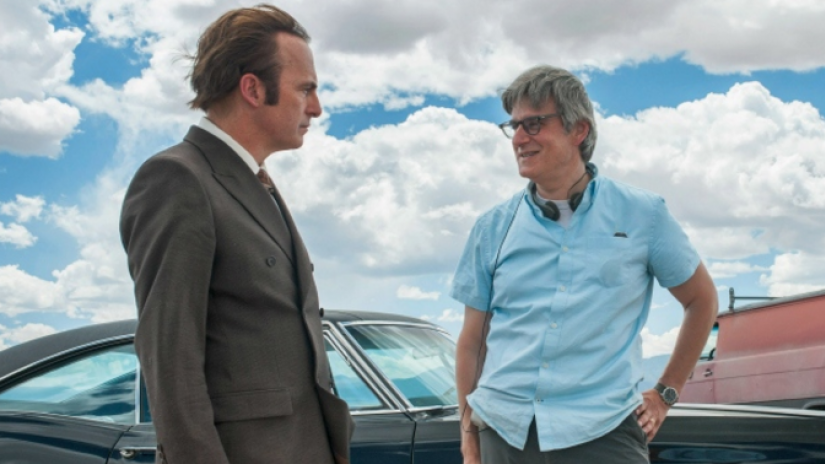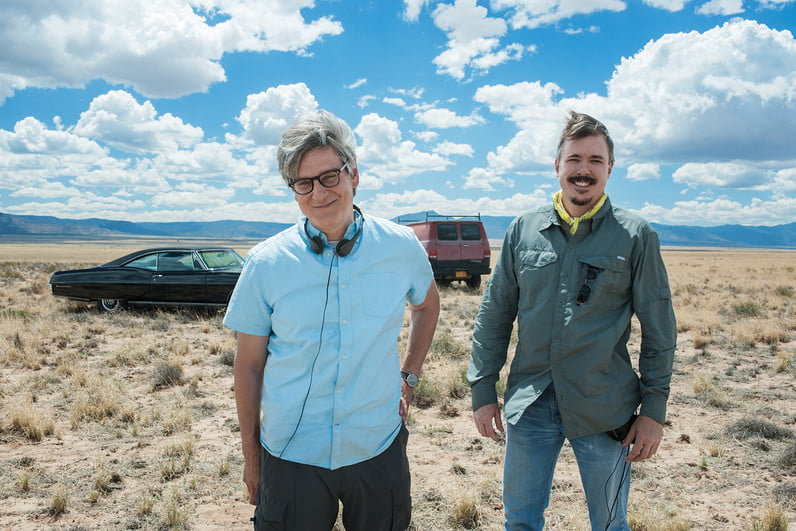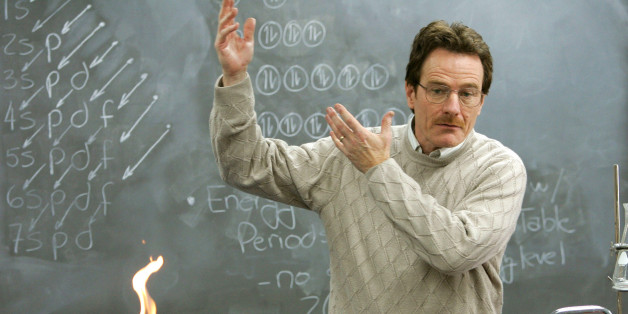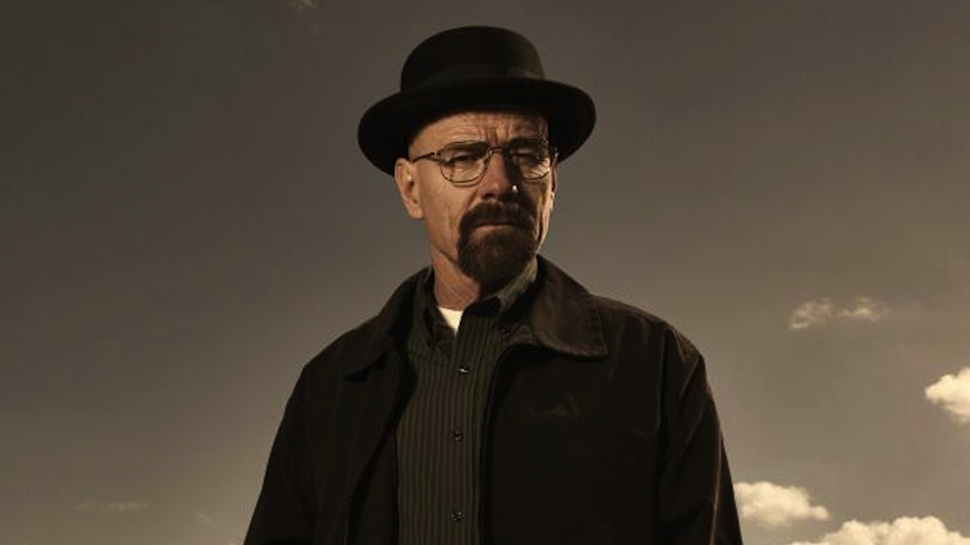While at first it seemed harmless enough, the next thing I knew I was binging on episodes. I became obsessed with it. As soon as it was finished, I needed another fix. I scoured articles on the web looking for anything I might have missed, any clues on what to expect next and reliving the episodes through complete strangers’ analysis. Just like the blue substance at the core of the show, I was hooked on something that was as close to perfection as I had ever seen. I was an addict. My drug of choice was Breaking Bad.
When I recently had the honor of speaking at length with Breaking Bad co-executive producer, writer and director Peter Gould, to say I was thrilled would be an understatement. The conversation that ensued was fascinating on so many different levels. Peter was gracious with his time and spoke frankly about the struggles he went through before he became a success, what it was like in the Breaking Bad writers room, the real meaning of visual filmmaking as he sees it, some alternate endings for the Breaking Bad series finale that never came to fruition, some clues on what to expect from the Breaking Bad spin-off Better Call Saul, and even blessed me with an Easter egg exclusive from one of the final episodes. All that and more below.
"There were some real dark nights of the soul."
Your credits range from Double Dragon to Breaking Bad and Too Big to Fail. How did you make that jump?
I wouldn’t say it was a jump so much as a slippery mountain climb — with a lot of backsliding. The big transition for me was from teaching film production at USC to becoming a full-time writer.
Did you ever get to the point where you thought “I’m never going to make it as a writer?” If so, how were you able to continue pushing forward towards your goal and become the success you are today?
Absolutely. You know how they say the definition of insanity is doing the same thing over and over again, while expecting different results? That’s how I was about writing feature spec scripts. I wrote literally dozens of them. Over and over again, I would almost make that big spec sale. Looking back, some were good, a couple were excellent. But the more commercial I tried to be, the more I tried to write for the marketplace, the less pleased I was with the results.
There were some real dark nights of the soul.
My career didn’t really take off until my wife got pregnant (just after losing her job). Wham! The crushing pressure of impending fatherhood. Don’t get me wrong, there was joy also — being a father is the best thing that’s ever happened to me. But supporting a family? That seemed impossible. It was put up or shut up time.
I came up with a three-pronged plan to either start making a serious living in the business or to make teaching my full-time career. I would make spec TV commercials, I would pitch TV projects… and I would write one last spec script.
For this spec feature script I chose the least “commercial” idea I’d ever had. It was based on a true story that I just couldn’t get out of my head. I stopped worrying about whether it would sell (I was sure it wouldn’t) and followed my instincts. I wrote a screenplay that just felt right, and that’s when things started to click.
Soon after, HBO hired me to write a movie. I’ve been working ever since.
It still hasn’t been produced, but that one “uncommercial” script drove the rest of my career.
What was your life like before you became a writer?
I always wanted to be involved in film as far as I can remember. I’m sure when I was six or seven I may have wanted to be an airline pilot or an astronaut but after that it was all about movies and theater to me. I worked as a production assistant on a bunch of movies in New York. I worked in editorial on TV commercials and features and then I went to USC film school where I had an incredibly transformative time and I met so many of the people who are still really important in my life. When I graduated from USC I was lucky enough to get to direct one of the graduate projects and so I was briefly “Flavor of the Month” as a director and that amounted to pretty much nothing. If you watch the Christopher Guest movie The Big Picture I think that’ll give you a pretty good idea what my experience was like.
I ended up going back to USC when a friend of mine who was teaching a class that he wasn’t able to finish turned it over to me. I was very fortunate I taught film production at USC for quite awhile. That was also just a fantastic experience. I think one of the great things about teaching is that it just helps you understand your own creative point of view about how things go together.
I hate to say it but I don’t think I ever really had a job that didn’t involve show business or filmmaking in some way. I always wanted to be involved in filmmaking but getting in wasn’t so easy and making a living at it took forever. It was basically a ten year struggle to get a foothold in the business. I think everybody pays their dues but not everyone pays them at the same point in their career.
"I'm in the empire building business."
SPOILER ALERT: From this point on various plot points are discussed across all seasons of Breaking Bad. If you haven’t finished the show yet consider yourself warned.
Can you tell me what it was like in the Breaking Bad writer’s room?
The writer’s room is where the major creative work from the writers point of view took place. There was 6 people plus Vince. We’d usually all be there as much as we could. We’d be there from roughly 10 in the morning until 7 at night, 5 days a week or longer if we got behind. I’d have to say it was really a pleasure working with the funniest people I’ve ever met. The darker the show got, the funnier the room got.
Vince Gilligan runs his show in a very unique way. He empowers his writers an awful lot. I almost said it’s “his show” but if you said to him, “It’s your show.” He’d always say, “It’s not my show. It’s our show.” That’s something that he would say not just to us but to Michael Slovis, the crew and the actors. He was very focused on everyone being empowered and as he would put it, “being fully invested” in the show.
One of the things that was great about that particular writers room is it wasn’t about whose idea was going to get used. It was about building on ideas. The analogy I would make would be to improvisational comedy where they always talk about instead of saying “No” you say, “Yes and…” That’s how we got some of my favorite moments. The one that I remember the best was in Season 3. It was the scene with Tortuga’s head on the tortoise. I remember that one person had the image of the head moving through the tall grass, then another person said, “Well the heads moving through the tall grass because it’s on a tortoise.” Then another person said,”And then the head explodes!” It really was an additive process. That’s what you hope for.
If you weren’t directing the episode how involved were you once the production process began?
The way Breaking Bad ran we produced our own episodes. Which means, we traveled to Albuquerque and the writer would normally be with the director through a nice chunk of prep. You would be sitting with the director in casting sessions, you’d be sitting in on prop sessions. One of the most important creative moments on the show is what we called a tone meeting. Which is where the director would sit down with the writer, a couple of producers and Vince. We’d go over the script and talk about it scene by scene and what we would hope to get out of each piece. The point of it was not to stomp on the director, the point of it was just to be very clear on what was intended by each scene. Most of us were very fortunate with the relationships we had with the directors we worked with. I worked with directors Terry McDonough and Adam Bernstein quite a bit and I learned so much from those guys about directing. We ended up having a great creative relationship. On one of the last episodes, I got to work with Bryan when he was directing an episode. I think Bryan really enjoyed having a writer there because of all the people on the set usually the writer and the director were the two who were the most focused on what story was coming through at each moment. Although we would have another producer there, Melissa Bernstein who was very much aware of what was going on. One of the things that would happen is if the actors would change the dialogue our script supervisor Helen would turn to the writer on the set and say, “ What do you think? He said ‘the’ instead of ‘and’…” We’d have to make a split-second decision about whether we were going to correct that or whether it was fine the way it was. That was often a tricky executive decision at that point.
When you started with Breaking Bad you were a story editor, correct?
Those are really titles that have to do with the Writers Guild and other things. At Breaking Bad it was pretty much the same. It was writing episodes, breaking them, working on the production and also working on the post production. Just like we would sit in on the production, we were also empowered to sit in on the editing of the episodes and also on the sound work. So, that work was pretty similar for all those years. Although the first year of the show for me, Season One was truncated because we had the writer’s strike. I finished writing my episode and then I had to leave Albuquerque during prep. I was on the picket line and I knew in Albuquerque they were shooting my scenes and I just had no idea what was going on. My experience of getting on set and working with the actors, the director and the DP didn’t come until Season 2.
By the end of the run of the show you were co-executive producer, writer and director. So like Walter White in Breaking Bad you went from humble beginnings to kingpin status. Can you talk about your evolution throughout the run of the show and how it may have coincided with Walter White’s perhaps?
I’m in the empire building business! (Laughing) Well that’s very interesting. I’m not sure how far I could parallel Walt’s evolution. Walt started out as an expert chemist and turned his chemistry knowledge to meth. I started out as a writer who knew how to write. I had written pilots and movies but in my career I had never written someone else’s characters. I had never tried to write on a TV show. So a lot of my evolution on the show was learning about the show and how Breaking Bad told stories. Also hopefully getting to contribute to how Breaking Bad told stories and contributing to how the story of Breaking Bad evolved. In the first season, Vince wrote the first three scripts and we would all read them and it was incredibly intimidating because he’s an unbelievable writer. When you look at someone else’s completed work and then you look at your own work in progress it can be kind of debilitating. I saw Vince’s scripts, and I think we all felt this way, I thought, “Wow these are just fantastic.” He’s such a good writer. Then the other writers came in. Patty Lynn wrote the first one that Vince didn’t write and she did a great job. Then George Mastras wrote a script that I thought was a game changer in Season One. It was sort of like being on the railroad tracks and watching the train coming towards you. When it was my turn there was a lot of anxiety about trying to write a script that could stand beside the other ones that I was reading.
With the last season, I knew that my episode was going to follow one written by Moira Walley-Beckett, who is an unbelievable writer and directed by Rian Johnson, who is to my mind one of the best visual directors working right now. One of the great things about working with people that are excellent is that it forces you to raise your own game. I don’t know if that necessarily parallels Walt’s experience but that was my experience on the show.
It may oddly enough parallel it pretty well. Walt took chemistry, which he was familiar with and then he had to apply it to cooking meth. Then he had to step his game up because of the competition.
I’ll buy that. If I’m Walt then Vince would be Gus in my story. (Laughing)
So you’re going to take Vince out and then takeover?
I’m going to have to raise my game to match his because he’s the ultimate chess player. So, hopefully I’ll get lucky like Walt and take him out.
Clearly, I’m joking. It all comes from a place of deep respect and love.






